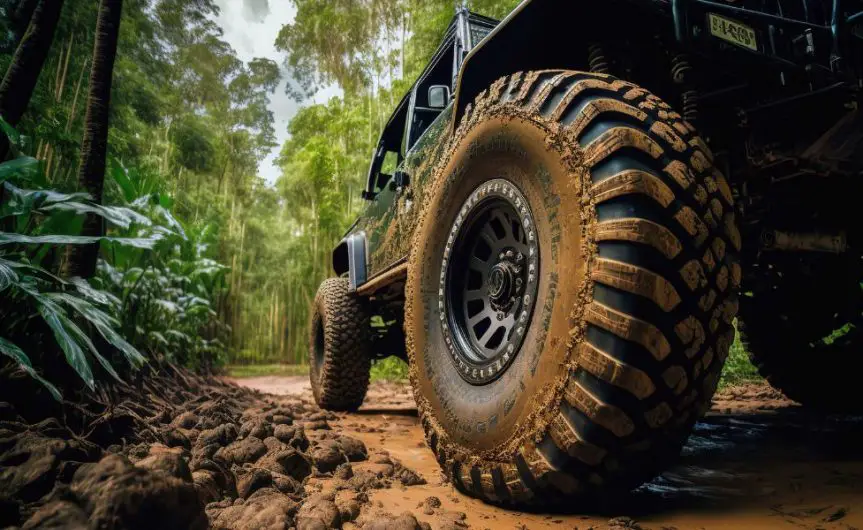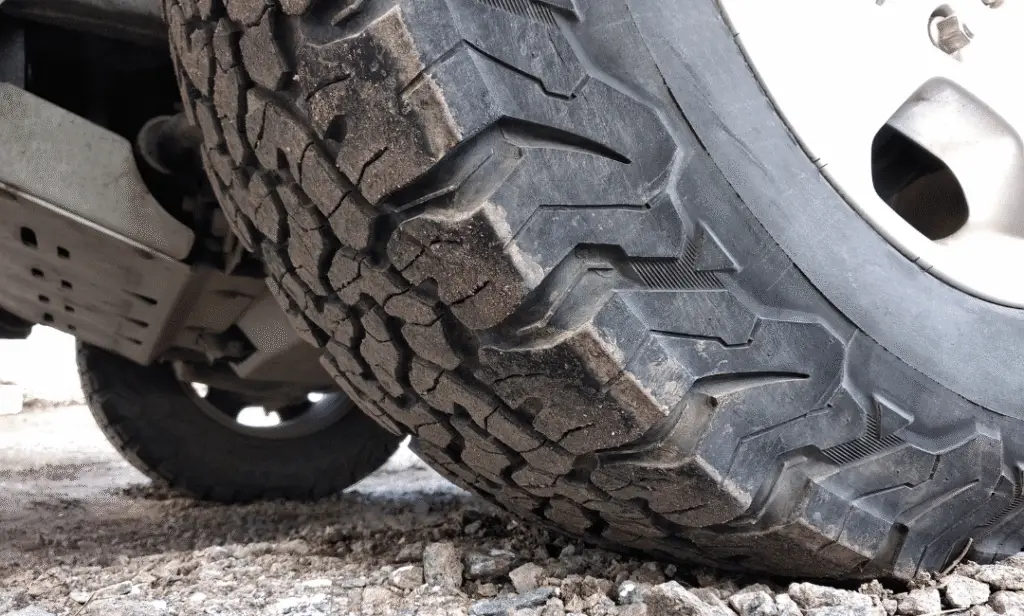Do all-terrain tires last longer? All-terrain tires generally last between 30,000 and 50,000 miles (ca. 80,467 km), depending on usage and maintenance. While they offer a good balance of on-road comfort and off-road capability, their lifespan can be shorter on highways due to their aggressive tread design.
If you’ve been considering investing in all-terrain (A/T) tires, one of the key questions on your mind is likely, “Do all-terrain tires last longer?” The lifespan of a tire is determined by various factors, including driving habits, road conditions, tire construction, and maintenance practices. All-terrain tires are designed to offer the perfect balance between on-road comfort and off-road capability. But, do they really last longer than other types of tires, such as all-season or mud-terrain tires?
Let’s explain the various aspects that affect the durability of all-terrain tires and answer whether they live up to expectations when it comes to longevity.

Contents
What Are All-Terrain Tires?
All-terrain tires are engineered to provide a smooth ride on paved roads while also being capable of handling rough, off-road conditions like dirt, gravel, mud, and snow. These tires offer a versatile solution for drivers who frequently travel between highways and off-road terrains.
The tread pattern of all-terrain tires is a key differentiator. Unlike all-season tires, which feature smaller grooves and tighter patterns, all-terrain tires have a more aggressive tread with larger voids and deeper grooves. This design helps provide better traction on uneven surfaces but can also lead to more rapid wear, especially on highways.
Factors Affecting the Lifespan of All-Terrain Tires
The lifespan of all-terrain tires can be influenced by several key factors. They are –
1. Tire Construction and Rubber Composition
The construction and materials used in all-terrain tires play a significant role in their durability. All-terrain tires often feature stronger sidewalls and thicker rubber compounds to withstand harsh off-road conditions. These tires are designed to be more robust compared to all-season tires but can still wear down faster under certain conditions.
However, the rubber compounds used in all-terrain tires are typically softer than those in all-season tires. Softer rubber provides better grip on rough terrain but also tends to wear out faster on smooth, paved roads. Therefore, while they may last longer under off-road driving conditions, their lifespan can be significantly reduced when used primarily on highways.
2. Driving Habits and Conditions
The driving habits have a direct impact on the lifespan of the tires, including all-terrain tires. Drivers who frequently engage in aggressive driving, such as rapid acceleration, hard braking, and sharp cornering, will experience faster tire wear. On the other hand, smooth, controlled driving can extend the life of your all-terrain tires.
Additionally, tire wear is influenced by road conditions. If you predominantly drive off-road or on rough terrain, the tires will naturally wear faster due to the abrasive nature of the surface. However, if you use your all-terrain tires mainly for highway driving, you may experience quicker wear due to the aggressive tread design, which creates more rolling resistance.
3. Maintenance and Tire Care
Proper tire maintenance is critical for prolonging the lifespan of all-terrain tires. Regular tire rotations, proper inflation, and wheel alignments can help prevent uneven wear and ensure that the tires wear more evenly over time.
- Tire Pressure: Keeping the all-terrain tires properly inflated is essential for even wear. Over-inflated tires wear out in the center of the tread, while under-inflated tires wear unevenly on the edges.
- Tire Rotation: Rotating the tires every 6,000 to 8,000 miles (ca. 12,875 km) helps ensure that they wear evenly and extends their overall lifespan.
- Wheel Alignment: Misaligned wheels can cause uneven tire wear, reducing their lifespan.

Comparing the Lifespan of All-Terrain Tires with Other Tire Types
While all-terrain tires are built for durability, how do they compare to other tire types like all-season and mud-terrain tires in terms of longevity? Below is the typical lifespan of different tire types:
| Tire Type | Average Lifespan | Best Suited For | Pros | Cons |
|---|---|---|---|---|
| All-Terrain (A/T) | 30,000–50,000 miles | Mixed on- and off-road driving | Versatile, good traction on various surfaces | Quicker wear on highways, higher rolling resistance |
| All-Season | 50,000–70,000 miles | Primarily highway driving | Longer lifespan, better fuel efficiency | Limited off-road capability |
| Mud-Terrain (M/T) | 20,000–40,000 miles | Extreme off-road conditions | Exceptional off-road traction | Rapid wear on highways, noisy ride |
From the table above, it’s clear that all-terrain tires tend to last longer than mud-terrain tires, but are not as long-lasting as all-season tires. This balance of durability and versatility makes all-terrain tires, a popular choice for drivers who need performance in both on-road and off-road environments.
Do All-Terrain Tires Last Longer on Paved Roads?
The longevity of all-terrain tires can vary depending on how they are used. When driven on smooth, paved roads for extended periods, the aggressive tread pattern of all-terrain tires can cause faster wear due to the increased rolling resistance. All-terrain tires are not designed for high-speed highway use over long distances, so their tread can wear down more quickly compared to all-season tires.
If your primary driving is on highways, you might find that your all-terrain tires need to be replaced sooner than if you were using them for mixed conditions. On the other hand, when used for their intended purpose—mixed on- and off-road driving—these tires will likely last much longer.
How to Extend the Lifespan of the All-Terrain Tires
Proper maintenance and mindful driving can significantly extend the life of the all-terrain tires. Below are some essential tips to help you get the most out of the tires and avoid premature wear.
1. Drive Smoothly: Avoid aggressive driving such as rapid acceleration and hard braking. Smooth driving helps reduce stress on the tires, extending their life.
2. Proper Tire Pressure: Check the tire pressure regularly to ensure it’s within the manufacturer’s recommended range. Under- or over-inflated tires wear out faster.
3. Regular Tire Maintenance: Rotate your tires every 6,000–8,000 miles and have your wheels aligned regularly to ensure even wear.
4. Use Tires for Intended Purpose: Try to use your all-terrain tires primarily for off-road or mixed conditions, as their tread is designed for these types of surfaces. Extensive use on highways will cause quicker wear.
Frequently Asked Questions
Here are some FAQs about all terrain tires lifespan –
1. Can all-terrain tires be used for highway driving?
Yes, all-terrain tires can be used for highway driving, but they tend to wear faster on smooth, paved roads due to their aggressive tread pattern. They are best suited for mixed on- and off-road driving.
2. Do all-terrain tires offer good traction in the snow?
Many all-terrain tires are designed with larger, deeper grooves to provide decent traction in light snow conditions. However, they may not perform as well as dedicated winter tires in deep snow or icy conditions.
3. Are all-terrain tires noisier than all-season tires?
Yes, all-terrain tires typically generate more road noise compared to all-season tires due to their more aggressive tread pattern, especially when driven on highways.
4. How can I maximize the lifespan of my all-terrain tires?
Regular tire maintenance, including proper inflation, rotations, and alignment, can help extend the lifespan of all-terrain tires. Additionally, avoiding aggressive driving and using the tires primarily for off-road conditions can prevent rapid wear.
Conclusion
The lifespan of all-terrain tires depends on various factors such as the type of driving, road conditions, and tire maintenance. All-terrain tires are designed to be versatile and durable, but they do not last as long as all-season tires when used predominantly on highways. Their lifespan is generally in the range of 30,000 to 50,000 miles (ca. 80,467 km), depending on how well they are maintained and how they are used.
For drivers who need tires that can perform both on- and off-road, all-terrain tires offer a good balance of durability and performance. By taking care of your tires and using them for the right purposes, you can ensure that they last as long as possible.